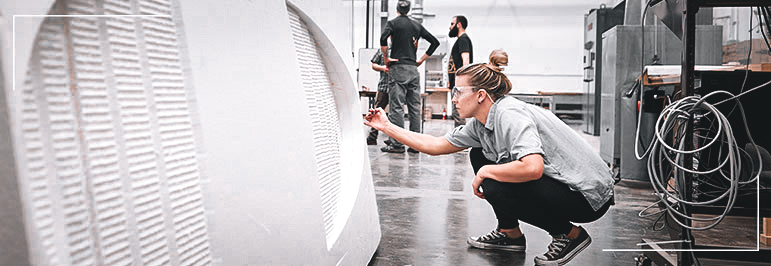Engineering Technology - Composites

Engineering Technology - Composites - AAS
BTC’s Composites Engineering Technology program provides hands-on experience focused on aerospace and industrial manufacturing. This discipline combines mechanical design, fabrication, and material science, as students apply theoretical engineering principles with practical hands-on technical projects. Students design, build, and test products using innovative polymer materials like carbon fiber.
Graduates are prepared for careers in CAD/CAM, CNC automation, metrology, Quality Assurance, Non-Destructive Testing (NDT), Ultra-Sound Inspection (UT), materials testing, assembly, and more. By specializing in composites engineering, students are prepared to fill a growing need for skilled engineering technicians around Washington state. Graduates from this program have high earning potential with opportunity for growth and upward mobility.
With transferable core classes in math, science, communications, and technical writing, you’ll be well positioned to transfer to a four-year college or university to complete your bachelor’s degree in engineering or advanced manufacturing.
Employment Information
Data are provided on a program (not credential) level
64% BTC graduate placement rate1
$69,574 starting annual wage2
$87,621 average annual wage2
$111,647 potential annual wage2
Entry Information
When Can I Start?
Students may begin working toward this degree quarterly.
What are the Minimum Entry Requirements?
A completed college admissions application and placement in English and math. BTC uses a Guided Self-Placement process to help you choose the best starting point for your English and math courses. Your selections will determine whether you begin with program coursework or complete prerequisites classes first.
To get started or for help determining your English and math placement, contact the Outreach department at Outreach@btc.edu.
What are My Next Steps?
Classes
Total Program Credits: 90
Academic Core
AMATH 111 Applied Technical Math 5 CR OR MATH& 141 Precalculus I 5 CR AND MATH& 142 Precalculus II 5 CR or higher Calculus CHEM& 121 Introduction to Chemistry 5 CR or higher Chemistry ENGL& 101 English Composition I 5 CR CMST& 210 Interpersonal Communications 5 CR OR CMST& 220 Public Speaking 5 CR
TOTAL Academic Core Course Credits20 CR Engineering Core
ENGR 100 Engineering Orientation 2 CR ENGR& 104 Introduction To Engineering & Design 5 CR ENGR 115 Graphics 5 CR ENGR 180 Parametric Modeling 5 CR
TOTAL Engineering Core Course Credits17 CR Composites Core
COMP 101 Survey of Composites 3 CR COMP 121 Composite Design & Fabrication I: Ski Building 5 CR COMP 222 Composites Design and Fabrication II: Aerospace Applications 5 CR COMP 235 Materials Testing 5 CR ENGT 215 Applied Statics 5 CR ENGT 222 Advanced Parametric Modeling 5 CR ENGT 250 Capstone Project 5 CR MACH 191 Manual Machining for non-Majors 5 CR MACH 193 CNC Machining for non-Majors 5 CR
TOTAL Composites Core Course Credits38 CR Engineering Electives
CAP 101 Microsoft Computer Applications 5 CR CS& 131 Computer Science I C++ 5 CR ENGL& 235 Technical Writing 5 CR Any ENGR, ENGT, or COMP course 100-level or higher Any Chemistry course with the prefix CHEM* at the level of CHEM& 121 or higher Any Math course with the prefix of MATH* at the level of MATH& 146 or higher Any Physics cousre with the prefix PHYS* at the level of PHYS& 110 or higher
TOTAL Engineering Electives Course Credits10 CR
Program Outcomes
After successfully completing the AAS-T degree, students will be able to:
- Apply fundamentals of material science to solving hands-on engineering design and fabrication problems.
- Utilize CAD/CAM software to build 3D parametric models.
- Create CNC programs for machining and automation.
- Draft Detailed Engineering Drawings for aerospace manufacturing and related fields per industry standards (ANSI).
- Solve problems in composite design and fabrication including vacuum bagging, wet-layup, infusion, pre-impregnated layup, out-of-autoclave, additive and subtractive manufacturing.
- Apply Quality Assurance (QA) methodology and inspection techniques including Non-Destructive Testing (NDT), Ultra-Sound inspection, and metrology.
- Perform material testing and analysis including tensile and compression testing.
Employment Outlook
Employment in this field is expected to increase. Job openings for assemblers and fabricators, machine operators, and production workers and supervisors vary according to occupational specialty.
Potential positions for Composites graduates include:
- CAD/CAM CNC Programmer (both clean room and post cure)
- CNC machine operator (both clean room and post cure)
- Non-destructive testing machine operator, ultra-sound tester (NDT)
- Metrologist (Coordinate measuring machine operator (CMM))
- Manufacturing planner
- Quality Assurance Inspector
- Lab testing technician / material science / Destructive materials tester (load testing)
Composites graduates have the potential to enter the following fabrication industries:
- Aerospace, Unmanned Aerial Vehicles
- Automotive, Mass Transit
- Marine
- Medical
- Sports and Recreation
- Wind Energy
Faculty & Support

Peter Morgan
Composites Engineering TechnologyContacts
If you have questions about this program or want help with the admissions steps to Bellingham Technical College, please email outreach@btc.edu.
Current students wanting academic planning and support, can connect with the program Instructor(s) or email EngineeringNav@btc.edu
